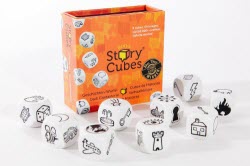Telling Stories with Games at Your Library
We are pleased to publish this article, the continuation of his six-part series on board game programming in public libraries, from John Pappas, the Branch Manager at the Bensalem Branch of the Bucks County Free Library System. (Read John's Board in the Library series Part One | Part Two | Part Three | Part Four | Part Five | Part Six or watch the archive of his webinar with Marti Fuerst, The Golden Age of Gaming: Board Games for Grown-ups.)
Introduction to Storytelling Games
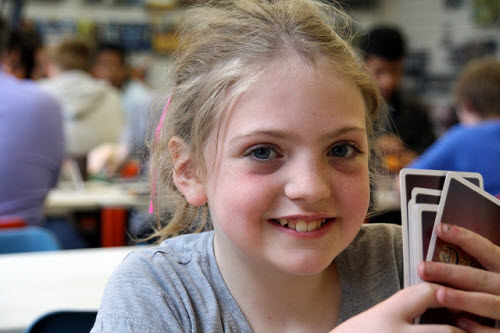 Storytelling games are a natural fit for a library. A library, itself, is a collection of stories. They are in the books, the movies, the media. They inhabit the meeting rooms, the social spaces, the computers. People meet, create and imbue a library with stories. So let us talk about storytelling games.
Storytelling games are a natural fit for a library. A library, itself, is a collection of stories. They are in the books, the movies, the media. They inhabit the meeting rooms, the social spaces, the computers. People meet, create and imbue a library with stories. So let us talk about storytelling games.
In a storytelling game, one of the main mechanisms is for the players to creatively craft (sometimes) disparate narrative elements into a cohesive story. Perhaps symbols on a die roll need to be interpreted to make sense. Maybe cards are played that need to be linked together with a similar narrative arc. Maybe you do this to score points or race to the finish. Maybe you just want to watch the show and story unfold. Or maybe you just like to watch the world burn.
It is a story and, honestly, it can go anywhere.
It can be a challenge to define exactly what a storytelling game includes. Most Role Playing Games (RPGs) are, at their core, games where a group of people tell a story together with one person helping to move and mold the narrative. Some groups prefer that the end result is a fantastic narrative while others would prefer to focus on game mechanisms and elements such as advancing in levels, gathering loot (points), defeating foes, or just getting to the end of a campaign.
Some games equate being creative with storytelling. So, for example, when you play many "party" games, you may have to create definitions, rhymes, or titles which due to their creative construction can be construed as "storytelling." Granted, I cringe a tad when I hear Cards Against Humanity being described as storytelling, but games such as Apples to Apples or Snake Oil require creativity for sure and the ability to weave a convincing tale.
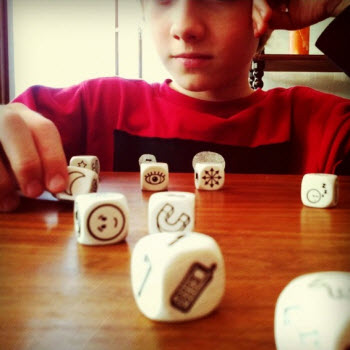 In this article, however, I'm referring to storytelling games where the act of storytelling is itself the main motivation of the game and the game-play is defined by the ability to take control of narrative elements through different auxiliary mechanics. Basically, you need to tell a story to determine who controls the direction of the narrative and is able to guide it to a preferred outcome.
In this article, however, I'm referring to storytelling games where the act of storytelling is itself the main motivation of the game and the game-play is defined by the ability to take control of narrative elements through different auxiliary mechanics. Basically, you need to tell a story to determine who controls the direction of the narrative and is able to guide it to a preferred outcome.
This is different from a game with narrative potential where a story may arise from other elements of game-play.
Most thematic games have some story elements and a particularly creative group of players can always work together to create a story. While this isn't mandatory to the game, it does increase the players' enjoyment and immersion into the game. Bottom line is that a thematic game may develop a narrative arc if the players wish it but it can still be enjoyed solely on other elements. Whereas a storytelling game needs the story for it to succeed as a game.
The story is the thing!
Below I'll describe and recommend some games where storytelling is directly needed to play and enjoy the game. They are placed in three broad categories: Beginner will have simple rules, easy game play, and limited strategic depth for entry level gamers (families, children, ducks, anyone really); Intermediate will have more complexity and strategy for those emerging gamers who have a couple of games under their collective belts (or the just those that seek some excitement); Expert will blow your mind with even more complexity and will appeal to fully-fledged, merit-badged and honored board gamers (or those that prefer to soar before they walk).
These categories are presented as guidelines and readers are encouraged to try whichever game strikes their fancy.
Beginner Storytelling Games
These games have simple rules, easy game play, and limited strategic depth for entry level gamers (families, children, ducks, anyone really). These categories are presented as guidelines and readers are encouraged to try whichever game strikes their fancy.
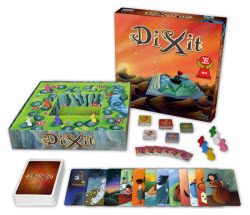 Dixit
Dixit
Dixit is a storytelling game for families who want to experience the joys of LSD without the annoying legality issues that arise with controlled substances. Each of the game's 84 cards is a strangely surreal image where players take a turn as the storyteller and choose one card from her hand of 6. The storyteller then has to make up a sentence, sing a song lyric, quote some poetry, or utter an incomprehensible vocalization, which in some way describes the image on the card.
Every other player then selects a card from their hands which best matches the song/utterance/poem/vocalization and gives the card to the storyteller. After all the cards are shuffled and flipped, the players bet on which picture belongs to the storyteller.
This is another easy to teach game with broad appeal. I've seen this one work well for groups of families, experienced gamers, seniors, and kids. Add to that all the expansions you can add to the base deck of cards, and you have plenty of play.
Rory's Story Cubes
This is an even simpler game that's engaging for any number of players of all ages. Each chunky 1" cube has 6 icons, with a total of 54 icons all-together in a set of cubes. You roll all 9 cubes to randomize the images and then create story from the resulting roll starting (of course) with the iconic "Once upon time..." and ending however you wish.
This is a tiny game (you could argue that it is really just an activity) which takes very little shelf space, is inexpensive, can be learned by staff quickly and has multiple uses from storytimes and gaming nights, to staff in-services and ice-breakers. Additionally the game has several expansions, each with 9 new dice, and themed to different topic (Clues, Enchanted, Intergalactic, Medic, Prehistoria and Score).
Whatever combination is used, Rory's Story Cubes are fun for all and will likely get your creative juices flowing.
Intermediate Storytelling Games
These games have more complexity and strategy for those emerging gamers who have a couple of games under their collective belts (or the just those that seek some excitement). These categories are presented as guidelines and readers are encouraged to try whichever game strikes their fancy.
Gloom
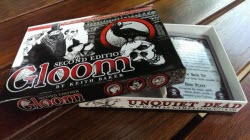 Take Edward Gorey, add a pinch of the macabre, add a pinch more of the macabre, add whatever macabre you have left in the cabinet, then mix in some card playing mechanisms and some of the coolest transparent cards ever and you have Gloom. In this card game players control a really, really, really weird Addams-like family with the equally strange goal of having each member die in the most distressed state as possible. This is accomplished by other players playing cards on your family with nice things happening and you placing horrible events on your family to shatter their personal self-image to the point of tears.
Take Edward Gorey, add a pinch of the macabre, add a pinch more of the macabre, add whatever macabre you have left in the cabinet, then mix in some card playing mechanisms and some of the coolest transparent cards ever and you have Gloom. In this card game players control a really, really, really weird Addams-like family with the equally strange goal of having each member die in the most distressed state as possible. This is accomplished by other players playing cards on your family with nice things happening and you placing horrible events on your family to shatter their personal self-image to the point of tears.
While you can play this story solely by the card-play alone, the real fun is weaving a twisted tale about how the patriarch of your family was menaced by mice or diverted by drink or ... overcome with otters. Gloom is called "The Game of Inauspicious Incidents and Grave Consequences" and it totally lives up to that title.
For added fun you can pick a setting for each game to help direct the narrative.
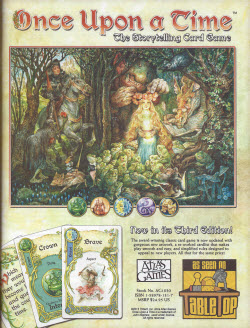 Once Upon a Time
Once Upon a Time
Once Upon a Time is from the same publisher as Gloom and while the game-play is clunkier, the theme is much less dark and potentially more approachable for younger groups. Unlike Gloom, where the competitive game-play can take over, Once Upon a Time encourages a slightly more collaborative atmosphere. Each player takes a turn as the Storyteller, and tells a story using the cards in her hand (all very common fairy tale tropes). Story cards allow the storyteller to guide the story towards their Ending Card (each player has a different ending card).
The other players can usurp the story through Interrupt Cards thus becoming the new Storyteller. The winner is the first person to lose all their cards and end the story. Although, honestly, just use the cards to make a hilarious story. When you play to win this game it can lose its appeal quickly.
Advanced Storytelling Games
These games will blow your mind with even more complexity and will appeal to fully-fledged, merit-badged and honored board gamers (or those that prefer to soar before they walk). These categories are presented as guidelines and readers are encouraged to try whichever game strikes their fancy.
Fiasco
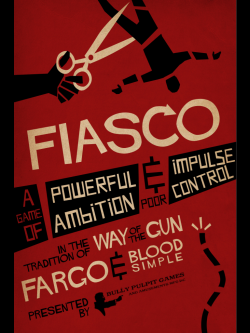 We are entering the wilds of storytelling games now and no game is wilder than Fiasco. This is also, without a doubt, my favorite storytelling game, so I'm a bit biased.
We are entering the wilds of storytelling games now and no game is wilder than Fiasco. This is also, without a doubt, my favorite storytelling game, so I'm a bit biased.
In the long standing tradition of heist/caper movies as well as the film noire, players are trying to plan something -- something not quite legal or particularly moralistic -- but something nonetheless. Also within that tradition, it will likely go poorly for everyone.
The game's primary mechanism is the creation (through dice rolls and charts) of a web of relationships, places, and things. The players then role-play and create the scenes.
Eventually even the best laid plans go to pot (the "Tilt" is introduced) and everything goes awry. It doesn't end well for anyone, including you, so don't even try. Just go out in a way befitting your station.
This is a wonderful entry level RPG if you are interested in introducing people to something outside of the standards from Dungeons & Dragons, Chaosism, or White Wolf. It does take a skilled or at least experienced player to moderate the game, though.
Tales of the Arabian Nights
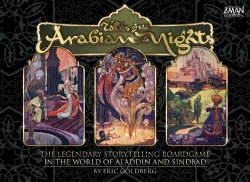 This is the only storytelling game on this list that actually look like a board game. In it, you travel across a medieval Middle Eastern landscape affecting the world with your actions while the world throws everything it has back at you! Just a heads up, the world has plenty to throw at you.
This is the only storytelling game on this list that actually look like a board game. In it, you travel across a medieval Middle Eastern landscape affecting the world with your actions while the world throws everything it has back at you! Just a heads up, the world has plenty to throw at you.
For example, you may end up a jilted lover, a penniless beggar, or a fantastic vizier. But it is more likely you will just end up hideously deformed.
As with many storytelling games, Tales is meant to be more of an experience for the players and less of a game. Meaning that the goal will be a fantastic story for each of the players rather than having one particular person relish in the glory of winning.
To play, you choose skills and abilities (stealth, luck, quick thinking), then you move around the map having encounters with various mundane and fantastical events. Having encounters is where this game enters the "Expert" realm. In Tales, you have to roll dice, check charts, and play cards to see what actually happens to you. Then you move through a very large "Choose Your Own Adventure"-type book to see where your story goes.
It can be a tad clunky and long to play but I guarantee the story will evolve so that you will talk about with friends, family, strangers -- anyone who will listen, really.
Honorable Mention
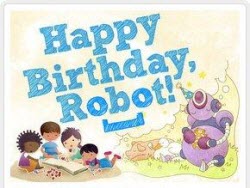 Happy Birthday Robot
Happy Birthday Robot
From the ephemeral Daniel Solis comes this game which is described as a "storytelling party game for clever kids, gamer parents and fun classrooms."
You never can be sure how much you will get to write or where the story will go. Could be a couple of words. Could be a bunch. But it starts with the words "Happy Birthday, Robot!" Unlike the other games in this list, this one was pretty much marketed as an "educational" game but coming from Solis, you can guarantee it will be fun and slightly weird.
 The Rub
The Rub
Storytelling games tend to rely upon shared experiences and a creative narrative arc. They don't focus on winning as a goal, so competitive players may not appreciate them as much. However, if players enjoy cooperative games (such as Pandemic or Forbidden Island), they may also appreciate a shared storytelling experience.
Storytelling games tend to be small in size, with limited components and smaller rules books. This makes them (mostly) portable and easy to teach quickly so they are nice for fledgling library board game collections and events, and it is simple to train staff on their use and play.
Unfortunately, storytelling games put people on the spot to be spontaneous, creative, or witty. This can alienate introverts or those that prefer long strategy over quick thinking.
Looking for a gateway into Role Playing Games? Many storytelling games can provide that experience without the "stigma" of playing an RPG or role playing. Don't get me wrong, I love RPGs. I'm just saying that some storytelling games can wet the whistle for someone who is creative, intuitive, and theatrical without having to face an immovable wall of intimidating geek culture.
Bottom Line
Storytelling games are creative and rely on imagination over strategy. Really, they should be a staple of any board gaming library collection. Were it up to me, everyone would have Dixit and Gloom in their library.
 About the Author
About the Author
If you ever want advice on starting a game group, selecting and cataloging a board game collection, or just want to know what I am playing, you can find me on Twitter, Google+, and (barely) on Facebook. You can follow my personal blog or check out my board game reviews at Troll in the Corner.
John Pappas is the Branch Manager at the Bensalem Branch of the Bucks County Free Library System. He enjoys talking about emerging technologies, gaming, public librarianship, outreach, and zen.

